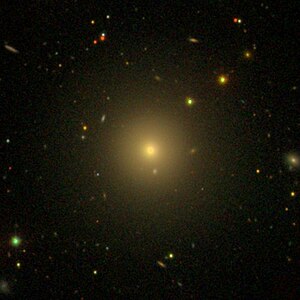NGC 6125
| Galaxy NGC 6125 / NGC 6127 / NGC 6128 |
|
|---|---|

|
|
| SDSS recording | |
| AladinLite | |
| Constellation | Dragon |
|
Position equinox : J2000.0 , epoch : J2000.0 |
|
| Right ascension | 16 h 19 m 11.5 s |
| declination | + 57 ° 59 ′ 03 ″ |
| Appearance | |
| Morphological type | E. |
| Brightness (visual) | 12.0 mag |
| Brightness (B-band) | 13.0 likes |
| Angular expansion | 1.4 ′ × 1.4 ′ |
| Surface brightness | 12.8 mag / arcmin² |
| Physical data | |
| Redshift | 0.016114 ± 0.000022 |
| Radial velocity | 4831 ± 7 km / s |
|
Stroke distance v rad / H 0 |
(224 ± 16) · 10 6 ly (68.6 ± 4.8) Mpc |
| history | |
| discovery | Wilhelm Herschel |
| Discovery date | April 24, 1789 |
| Catalog names | |
| NGC 6125, 6127, 6128 • UGC 10345 • PGC 57812 • CGCG 298-029 • MCG + 10-23-065 • 2MASX J16191155 + 5759028 • GC 4185 • H II 810 • NSA 146898 | |
NGC 6125 = NGC 6127 = NGC 6128 is a 12.0 mag bright elliptical galaxy of the Hubble type E0 in the constellation Dragon in the northern sky . It is an estimated 224 million light years from the Milky Way and about 90,000 light years in diameter.
In the same area of the sky is u. a. the galaxy NGC 6130 .
The object was discovered on April 24, 1789 by Wilhelm Herschel with an 18.7-inch reflector telescope, who described it as "pF, pS, lE". Due to an error in Herschel's position information , Swift's observations on June 28 and July 6, 1886, also flawed and with slightly different descriptions, led to two further entries in the catalog under NGC 6127 and NGC 6128 .
Web links
- NGC 6125. SIMBAD , accessed on 2 June 2016 (English).
- NGC 6125. DSO Browser, accessed June 2, 2016 .
